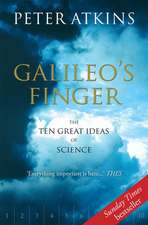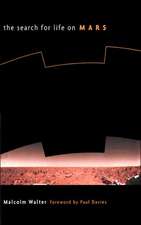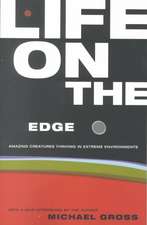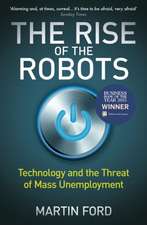Laboratory Earth: The Planetary Gamble We Can't Afford To Lose
Autor Steven H. Schneideren Limba Engleză Paperback – 2 oct 1998
Laboratory
Earthtaps
the
relevant
knowledge
from
physical,
biological,
and
social
sciences
needed
to
study
the
planet
holistically.
This
so-called
Earth
Systems
Science
fosters
a
new
way
to
understand
the
Earth
and
our
roles
as
inhabitants,
with
the
purpose
of
building
solutions
to
the
bewildering
global
environment
and
overdevelopment.Educational,
business,
health,
and
governmental
organizations
often
dissect
the
world
into
narrow
but
highly
specialized
disciplines—economics,
ecology,
cardiology,
meteorology,
glaciology,
or
political
science,
to
name
a
few.
But
real
world
problems,
like
urban
sprawl,
public
health,
poverty,
toxic
waste,
economic
development,
the
ozone
hole,
or
global
warming,
do
not
fit
neatly
into
disciplinary
boxes.
However,
author
Stephen
Schneider
asserts
that
these
contemporary
issues
must
be
viewed
as
systems
of
interconnected
subelements.
This
is
especially
true
for
global
environmental
problems,
since
they
arise
from
increasing
numbers
of
people
demanding
higher
standards
of
living
and
willing
to
use
the
cheapest
available
technologies
to
pursue
these
growth-oriented
goals,
even
if
the
unintended
byproducts
include
land
degradation,
toxic
pollutants,
species
extinctions,
or
global
climate
change.
To
first
understand
and
then
solve
such
problems,
we
must
learn
to
view
the
Earth
and
our
socioeconomic
engine
as
one
integrated
system.Schneider,
who
in
the
1970s
predicted
global
warming
would
become
“demonstrable”
by
the
turn
of
the
century,
chooses
that
debate
to
illustrate
how
this
twenty-first
century
Earth
Systems
Science
approach
works,
introducing
us
to
the
sharp
controversies
and
highly
visible
debates
among
climatologists,
ecologists,
economists,
industrialists,
and
political
interests
over
the
seriousness
and
solutions
to
the
climate
change
crisis.
He
begins
with
a
fascinating
journey
to
the
beginning
of
geologic
time
on
Earth
and
traces
from
there
the
coevolution
of
climate
and
life
over
the
next
four
billion
years.
Along
the
way
we
learn
about
the
Gaia
Hypothesis,
the
demise
of
the
dinosaurs,
and
the
likelihood
of
an
impending
ice
age.Schneider
traces
our
climatic
history
not
only
from
the
beginning
and
up
to
the
twentieth
century,
but
deep
into
the
twenty-first
as
well.
He
depicts
the
next
one
hundred
years
as
a
potentially
perilous
period
for
climate
and
life—unless
we
citizens
of
Earth
recognize
and
then
work
to
control
the
unintended
global
scale
experiment
we
are
foisting
on
ourselves
and
all
other
life
on
“Laboratory
Earth.”
This
“lab”
is
not
built
of
glass,
wires,
and
tubes,
but
of
insects,
soils,
air,
oceans,
birds,
trees,
and
people.
While
no
honest
scientist
can
claim
to
have
clairvoyant
vision
into
the
twenty-first
century,
Schneider
optimistically
demonstrates
that
enough
is
already
known
to
command
our
attention
and
to
insure
that
the
juggernaut
of
human
impacts
on
Earth
doesn't
turn
into
a
gamble
we
can't
afford
to
lose.
Preț: 107.33 lei
Nou
Puncte Express: 161
Preț estimativ în valută:
20.55€ • 21.13$ • 17.05£
20.55€ • 21.13$ • 17.05£
Carte disponibilă
Livrare economică 27 ianuarie-10 februarie
Preluare comenzi: 021 569.72.76
Specificații
ISBN-13: 9780465072804
ISBN-10: 0465072801
Pagini: 192
Ilustrații: black & white illustrations
Dimensiuni: 135 x 203 x 14 mm
Greutate: 0.18 kg
Editura: BASIC BOOKS
Colecția Basic Books
Locul publicării:United States
ISBN-10: 0465072801
Pagini: 192
Ilustrații: black & white illustrations
Dimensiuni: 135 x 203 x 14 mm
Greutate: 0.18 kg
Editura: BASIC BOOKS
Colecția Basic Books
Locul publicării:United States
Notă biografică
Stephen
S.
Schneideris
a
professor
in
the
Department
of
Biological
Sciences
and
a
Senior
Fellow
at
the
Institute
for
International
Studies
at
Stanford
University.
He
was
honored
in
1992
with
a
MacArthur
Fellowship
for
his
ability
to
integrate
and
interpret
the
results
of
global
climate
research
through
public
lectures,
seminars,
classroom
teaching,
environmental
assessment
committees,
media
appearances,
Congressional
testimony,
and
research
collaboration
with
colleagues.
He
has
authoredThe
Genesis
Strategy:
Climate
and
Global
Survival;
The
Coevolution
of
Climate
and
Life;
Global
Warming:
Are
We
Entering
the
Greenhouse
Century?;
Scientists
on
Gaia;and
over
two
hundred
scientific
papers,
reviews,
and
editorials.

















